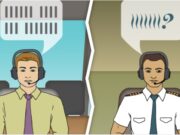A number of accidents, some of them fatal, and incidents have been attributed at least in part to communication issues related to the language proficiency of air traffic controllers and pilots.
The International Civil Aviation Organization (ICAO) mandated that pilots and air traffic controllers demonstrate language proficiency sufficient to deal with the linguistic challenges presented by quickly changing and dynamic abnormal situations and emergencies that require extended use of language outside that of standard radiotelephony (RT).
The language proficiency requirements are applicable to non-native English speakers but, according to a statement in ICAO Doc 9835, “Native speakers of English, too, have a fundamentally important role to play in the international efforts to increase communication safety.”
Still, it seems that the onus for safeguarding successful communication is on the non‑native English speaker. In many cases, non-native speakers are tested and taught how to approximate to native speaker norms when, in reality, many of them will have less opportunity to interact with native speakers.
English, the language of aviation, is a first language or widely used national language in approximately 60 ICAO member states, ICAO said several years ago in Doc 9835. But the document also says that “there are more speakers worldwide of English as a second or foreign language than as a first language, and most of the contexts in which English is used occur among speakers of English as a second or foreign language. Non-native users of English outnumbered native users at the start of the 21st century by approximately 3 to 1.”
So, it stands to reason that the majority of aeronautical radiotelephonic interactions are between speakers for whom English is not the first language; in other words, it is a lingua franca — a language used for communication among groups of people who speak different languages. I won’t go into too much, but these interactions are qualitatively different from the interactions that take place between native speakers.
When non-native speakers engage with other non-native speakers in English, either in an aeronautical or a non-aeronautical context, they come to the speech event with their own language ability, their own cultural expectations, their own first language interference and a host of other unique dimensions. These interactions are “de-territorialized speech events”1 not tied to any one specific culture and so are very “hybrid in nature.”2
Native speakers tend to take so much for granted: connected speech, complex localized language structures, lexis (vocabulary) and much more. This puts the native speaker at a disadvantage as these features of native English speech are particularly problematic to non-native speakers at lower levels of proficiency.
Native speakers are in the minority3 and so, it has been argued, it is as incumbent on the native speaker as on the non-native speaker to meet part way by bridging the gap in safeguarding successful communication.4 It would appear, from the evidence and the literature, that there is a need for native-speaking pilots and air traffic controllers to undergo training to learn how to accommodate their non-native English-speaking interlocutors in order to safeguard communication and mitigate against possible incidents.
I am conducting Ph.D. research to find out if communication can be improved as a result of native English speakers understanding language and knowing how to adjust their speech habits in accordance with language problems that non-native speakers may have.
The first part of the data collection process for my research is under way, and I am looking for survey responses from air traffic controllers, pilots and ground crew who use English to communicate over the radio as part of their jobs. I intend to use this data to inform the direction of a linguistic experiment, the details of which will be published in my thesis.
This is the link to the survey: https://www.surveymonkey.com/r/KLZ3B2T
The author is an aviation English instructor and examiner as well as a pilot.
Notes
- Seidlhofer, B. Understanding English as a Lingua Franca, 1st edition. Oxford, England: Oxford University Press, 2011.
- Jenkins, J. The Phonology of English as an International Language, 2nd edition. Oxford, England: Oxford University Press, 2001.
- Crystal, D. English as a Global Language. 2nd edition. Stuttgart, Germany: Cambridge University Press, 2012.
- Jenkins.
Featured image: © cienpies | VectorStock

